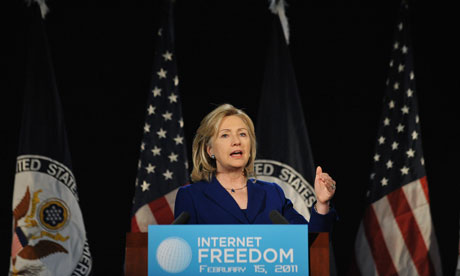
Photograph: Mandel Ngan/AFP/Getty Images.
Admittedly, I did not take the time to watch the full 43-minute speech by Secretary of State Hillary Clinton on Tuesday at George Washington University in which she spoke about the importance of internet freedom. Thankfully, others did and did not need much time to get online and blog about their opinions. Except for the Chinese viewers. While they were able to watch her speech, the Chinese government quickly removed most internet discussions and deleted all blog- and twitter posts about Clinton's speech. Ironic to say the least.
In her speech, she promoted worldwide internet freedom. She spoke about the repressive internet policies of governments of countries such as China, Iran, Vietnam, Myanmar, Cuba and Belarus to prevent anti-government sentiments from traveling across borders. Furthermore, she announced that the United States had awarded grants to technologists and activists to work around internet filters and enable people to use the online networking sources that governments are trying to block.
The Chinese government clearly was not impressed by Clinton's promising words. But even bloggers from the United States, who allegedly do not have to fear censorship, were not impressed.
Clinton addressed three main challenges in achieving worldwide internet freedom. One of these challenges being "transparency and confidentiality". Of course she could not address this issue without talking about WikiLeaks, to many the ultimate victory for freedom of expression. We know Obama's Administration position on the WikiLeaks controversy: they are not too happy about the publication of sensitive, classified government documents.
While Clinton spend nearly 40 minutes promoting internet freedom, she only needed a few minutes to justify the administration's strong criticism of WikiLeaks, calling the discussion on the constitutionality of WikiLeaks publications a "false debate". She said that the documents published by WikiLeaks were stolen and disagreed that stealing of government documents is justified when it surves the public interest.
She claimed that denouncing WikiLeaks "does not challenge our commitment to Internet freedom," and that allowing WikiLeaks to publish classified information poses a greater risk to the citizens of the United States than does preventing WikiLeaks from making classified information public.
Bloggers complained Clinton's failure to back up her claim that WikiLeaks puts diplomats, activists, and citizens at risk. While Clinton denies that the government has been attempting to stop WikiLeaks from publishing documents, bloggers challenge these claims.
Didn't the government's Department of Justice just obtain a court order directing Twitter to provide personal information about some of the key persons behind WikiLeaks, including IP addresses, private messages, and methods of payment?
These appear to be fairly extreme measures. Measures that could potentially lead to people shying away from openly supporting WikiLeaks. On the web, the question arose whether the government can make an exception in their effort to promote internet freedom by using every legal measure (or perhaps even illegal measures that are difficult to detect) to prevent embarrassing, or "dangerous" information from leaking out.
The speech left many questions unanswered and freedom of speech activists frustrated. WikiLeaks dangerous? Maybe some things are better left unsaid and do not contribute to the 'marketplace of ideas', but if the US is promoting transparency, why has president Obama, and Clinton for that matter, been so silent on the issue of WikiLeaks?
Clinton's speech has rekindled the heated debate over WikiLeaks and it is unlikely that president Obama can remain silent for much longer. While the public is divided on the question whether all government documents should be made available to the public, it seems that most people expect more transparency from a government which spends almost $50,000,000 on internet freedom initiatives. You gotta practice what you preach. Especially if you preach for 43 very long minutes.